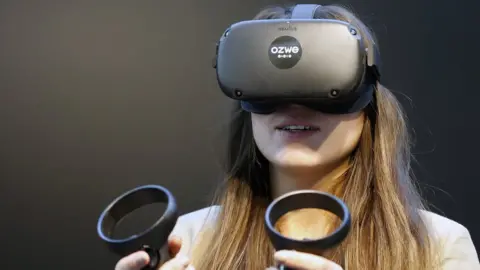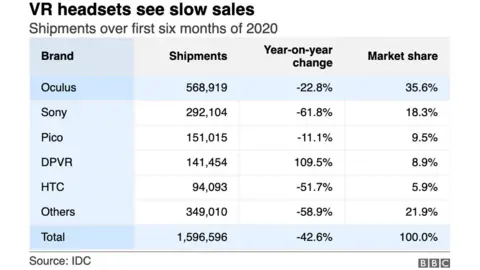Oculus Facebook account row prompts German competition probe
 Getty Images
Getty ImagesFacebook is under investigation by German officials over its virtual reality headset, the Oculus Quest.
The Oculus Quest 2 requires a Facebook account to work, something widely criticised by reviewers and VR fans.
Germany's competition authority now says that requirement could be an abuse of Facebook's dominant market position.
"We intend to examine whether and to what extent this... arrangement will affect competition in both areas of activity," the agency said.
Facebook acquired VR company Oculus in 2014, and allowed users to log in with their Oculus accounts until the launch of the Quest 2 headset.
Now, new users must use a Facebook account, and the company plans to cut support for the older Oculus accounts over time.
The Oculus Quest 2 has also been widely praised for its performance and low price compared to rivals - leading to widespread speculation that Facebook may be selling the device at a loss.
A dominant player
German regulator The Bundeskartellamt said it was pursuing the probe because Facebook is already a dominant player in the social media market in Germany, and was now "an important player in the emerging but growing VR (virtual reality) market".
Facebook has already voluntarily stopped selling Oculus headsets in the country, over concerns about meeting regulations.
It had previously been told not to combine different data sets from multiple services it owns - something which is still before the German courts.
"The fact that Facebook has resorted to various legal remedies is not surprising in view of the significance which our proceedings have for the group's business model," Bundeskartellamt's President Andreas Mundt said.
"Nevertheless, the resulting delay in proceedings is of course regrettable for competition and consumers."
Facebook said: "While Oculus devices are not currently available for sale in Germany, we will cooperate fully with the Bundeskartellamt and are confident we can demonstrate that there is no basis to the investigation."
Slow growth
The growth of the VR industry has been slow and steady, prompted in part by the success of the Oculus platform and competitors such as the Valve Index.
Several high-profile virtual reality game releases such as Half-Life: Alyx, Star Wars Squadrons, and upcoming VR support planned for Microsoft Flight Simulator, have fuelled interest in the technology among some gamers.
Analyst firm CCS Insight found that a lack of supply in the first half of the year hit the market, but projects that it will "grow strongly" for years to come.

"It's worth pointing out that an almost flat market is a good result in this extraordinary year," analyst Marina Koytcheva wrote in a blog post this week on the state of the VR and augmented reality (AR) market.
For example, the mobile phone market is expected to fall by 15% this year, she said.
